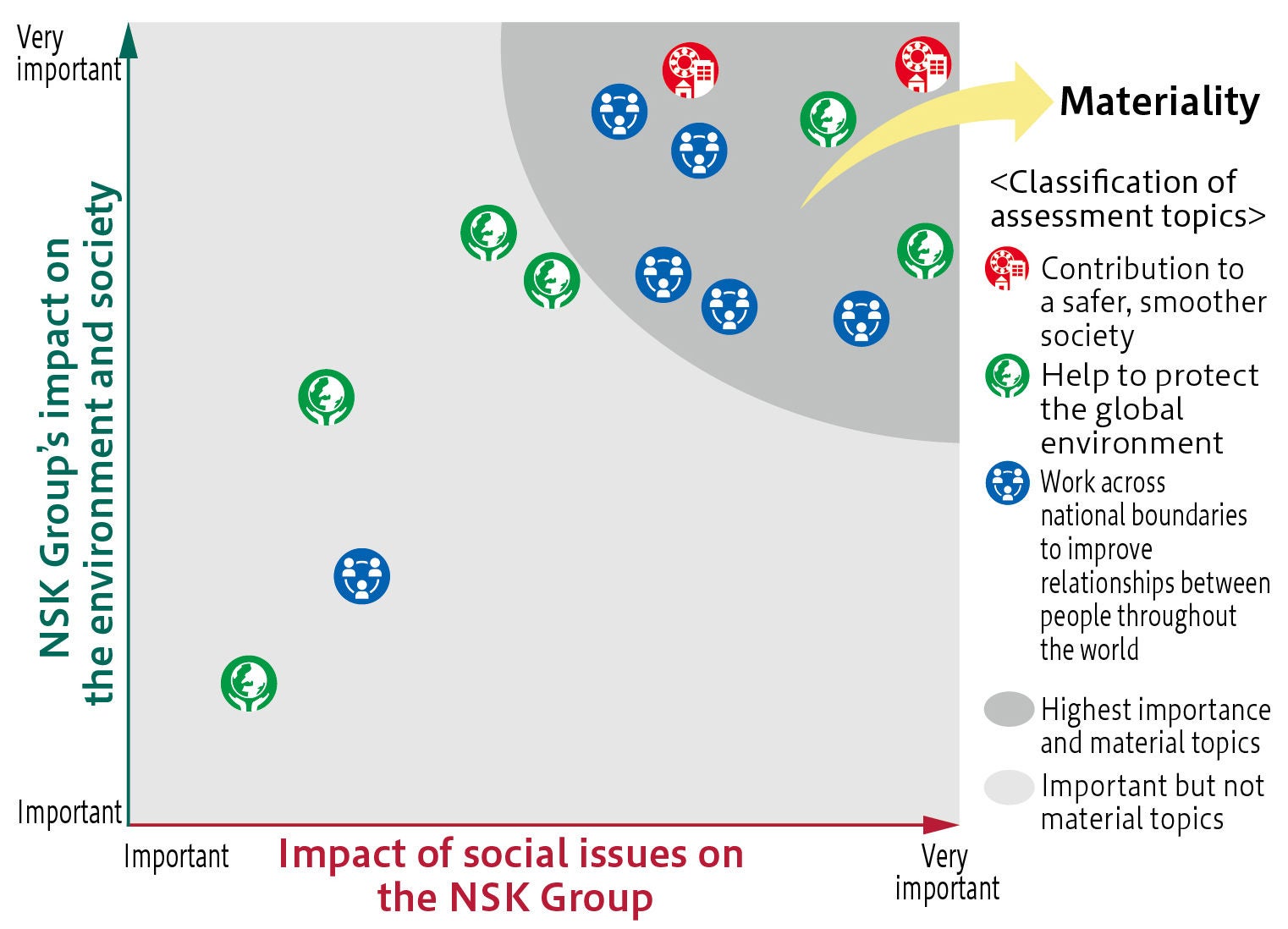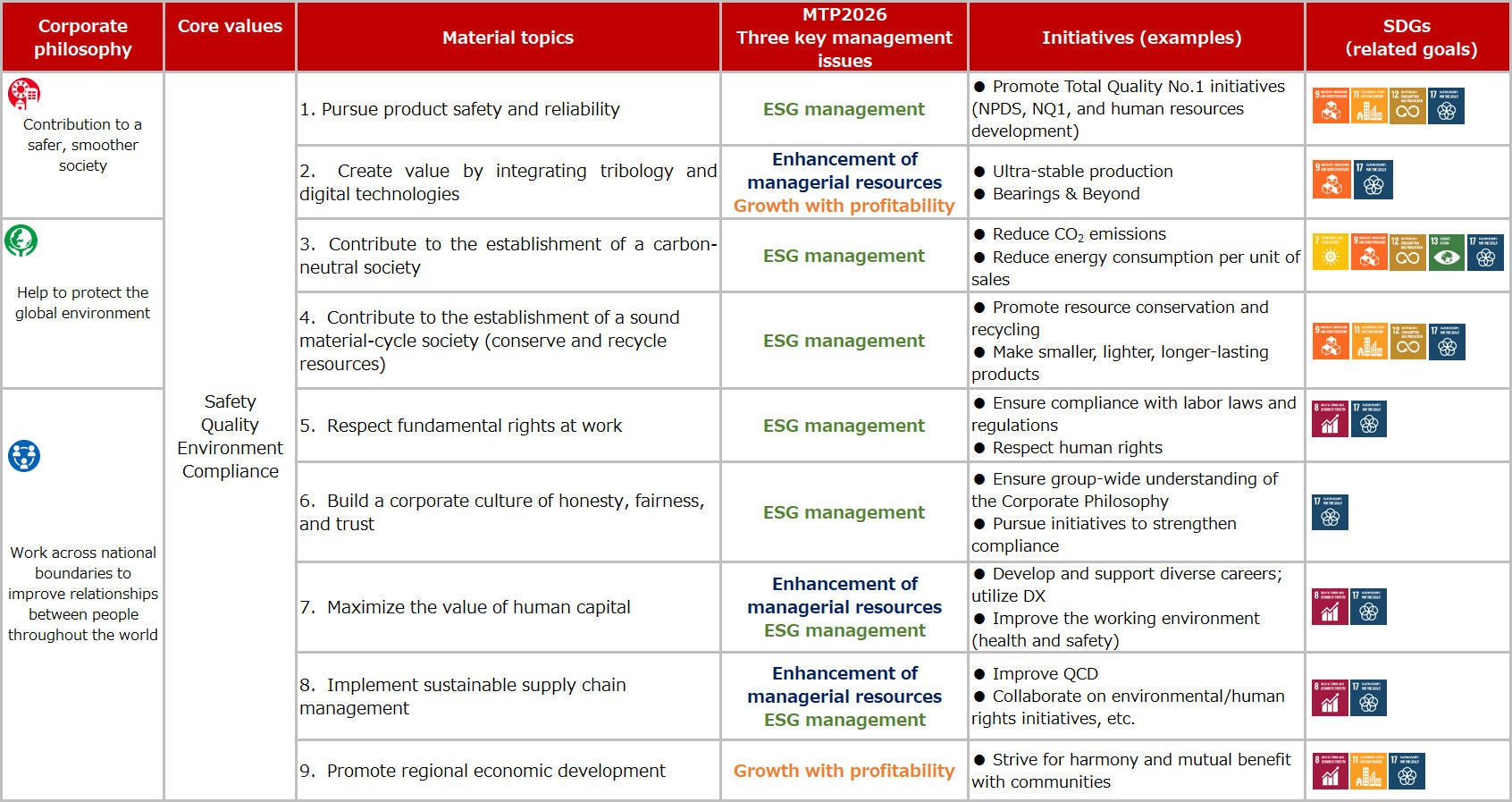Materiality
The NSK Group has identified nine material topics as the key sustainability areas on which it should focus its efforts. While living up to its corporate philosophy, the Group aims to contribute to the resolution of social issues with its sustainable growth by addressing these topics.
Material Topic Identification Process
Step 1: Selection of Subjects for Material Topic Assessment
We selected subjects that affect or could affect NSK’s sustainable growth and contribution to social issues from both short-term and mid- to long-term perspectives. Subjects such as product safety, helping to build a carbon-neutral society, and local community development were chosen for material topic analysis. The selection process primarily considered the following inputs.
- Standards, questionnaires, etc., reviewed:
(1) SDGs, GRI Standards, SASB Standards, ESRS
(2) Questionnaires from ESG research organizations
(3) Questionnaires/interviews with institutional investors
These assessment subjects align with the commitments to build a “safer, smoother society,” “protect the global environment,” and “improve relationships between people” articulated in NSK’s corporate philosophy, as well as the “safety,” “quality,” “environment,” and “compliance” NSK has positioned as core values.* They are also consistent with NSK’s SDGs Declaration, initiatives under its Mid-Term Management Plan 2026 (MTP2026), issues identified in annual risk assessments, and activities undertaken with stakeholders such as customers and suppliers.
*Core values: Common value criteria given top priority in management decision-making and actions
Step 2: Identification of Material Topics
Based on the concept of double materiality,* the importance of the assessment subjects was evaluated and mapped from both positive and negative perspectives in terms of the NSK Group’s impact on the environment and society (impact materiality) and the impact of social issues on the NSK Group (financial impact). The nine subjects with the highest importance were identified as material topics.

*Double materiality: A method of assessing material topics by evaluating not only the impact of changes in the external environment such as social issues on business, but also the impact of a company’s activities on external stakeholders, the environment, and society
Step 3: Deliberation by the Operating Committee
The nine identified material topics were finally determined by the CEO after deliberation by the Operating Committee, which consists of representatives from the executive divisions. They were then shared throughout the NSK Group via the Officers’ Meeting and reported to the Board of Directors. Material topics will be revised at least once every three years based on NSK’s management situation, changes in social conditions, changes in stakeholder requests, and other factors.
*The appropriateness of the setting and analysis content of the above identification process has been assessed with insights from an external consultant.
◆Identified Material Topics
Listed below are examples of the NSK Group’s impact on the environment and society and the impact of social issues on the NSK Group for each material topic.
<Contribution to a safer, smoother society>
1. Pursue product safety and reliability
- NSK Group’s impact on the environment and society:
Contributing to a safer, smoother society by offering products and services of outstanding quality - Impact of social issues on the NSK Group:
Growing profit by maintaining and strengthening competitiveness with enhanced quality products and services
For more details, please visit Quality Management.
2. Create value by integrating tribology and digital technologies
- NSK Group’s impact on the environment and society:
Contributing solutions to social issues by developing and providing products and services that meet customer expectations and needs - Impact of social issues on the NSK Group:
Growing profit by providing new products that meet customer needs
For more details, please see “Special Feature: Taking on the Challenge to Change & Go Beyond” in NSK Report 2024.
<Help to protect the global environment>
3. Contribute to the establishment of a carbon-neutral society
- NSK Group’s impact on the environment and society:
CO2 emissions from business activities / Contributing to reduced CO2 emissions from customers and their products by advancing products and technologies - Impact of social issues on the NSK Group:
Growing profit due to rising demand for electrification and products that contribute to reduced CO2 emissions / Carbon tax burden and need to invest in measures to reduce CO2 emissions
For more details about the impact, please visit Information Disclosure Based on TCFD Recommendations.
For more details about initiatives, please visit Climate Change Measures and Environmentally Friendly Products.
4. Contribute to the establishment of a sound material-cycle society (conserve and recycle resources)
- NSK Group’s impact on the environment and society:
Environmental impact due to discharge of waste, etc. / Effective utilization of resources - Impact of social issues on the NSK Group:
Growing profit due to rising demand for extended life of products, size and weight reductions, and CMS, etc.
For more details, please visit Resource Circulation.
<Work across national boundaries to improve relationships between people throughout the world>
5. Respect fundamental rights at work
- Impact of social issues on the NSK Group:
Avoiding risk of loss of business opportunities and decline of social trust in the company
For more details, please visit Respecting Human Rights.
6. Build a corporate culture of honesty, fairness, and trust
- Impact of social issues on the NSK Group:
Avoiding risk of loss of business opportunities and decline of social trust in the company
For more details, please visit Compliance.
7. Maximize the value of human capital
- Impact of social issues on the NSK Group:
Improving productivity and driving innovation by maximizing the human capital value of employees
For more details, please visit Human Resource Management.
8. Implement sustainable supply chain management
- NSK Group’s impact on the environment and society:
Reducing environmental impact across the supply chain - Impact of social issues on the NSK Group:
Improving production efficiency and product competitiveness by practicing better QCD, etc. in the supply chain
For more details, please visit Supply Chain Management.
9. Promote regional economic development
- NSK Group’s impact on the environment and society:
Contributing to regional economic development by localizing production, sales, and technology - Impact of social issues on the NSK Group:
Achieving growth of the NSK Group driven by global business expansion
For more details, please visit “Social Participation to Promote Social Progress.”

